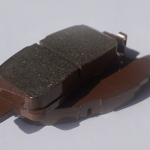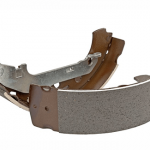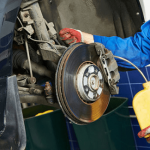Brake Maintenance
Someday, you might need a repair on your vehicle to the brake lines, the brake booster or the brake master cylinder — but, unless they become damaged under special circumstances, these parts should last the life of your car. But there are other parts of your brake system that need some regular maintenance. How do you know when it’s time to visit the service center? We’ll help you out on this page. Or, just give our service center a call and tell us about your ride. One of our service advisors will be happy to answer any questions you might have. Below, you’ll find four maintenance services that will make the brake system last longer and perform better on your car.

1. REPLACE BRAKE PADS
According to Chevrolet, your brake pads will need to be replaced every 40,000-60,000 miles under normal use. The brake pads feature a friction material that can press against your car’s brake rotors and create friction, without damaging the rotors. However, that friction material wears down over time. Eventually, you’ll need to replace the brake pads, otherwise the metal backing will grind into the brake rotors, causing significant damage.
2. REPLACE BRAKE SHOES
While disc brakes are far more commonplace today, drum-style brakes can still be found on a handful of Chevy models on the rear wheels. You can also find drum brakes on a variety of vintage Chevrolet vehicles. Inside the drum brake, the drum shoes are pushed outside against the wall of the brake drum, creating friction that slows you down. Just like the brake pads, your brake shoes will need to be replaced before they wear out. They can often last even longer than disc brake pads, so we recommend just having your brake system inspected regularly. Chevrolet doesn’t provided a recommended replacement interval for brake shoes.

3. REPLACE BRAKE ROTORS/DRUMS
On most new Chevrolet vehicles, all four wheels are equipped with disc-style brakes. Disc brakes work when the brake calipers clamp down on the rotating brake rotors, creating friction and slowing down your car. Over time, these brake rotors will start to wear down. This process can be accelerated by debris in the brake system, or brake pads that are too worn down. Chevrolet does not recommend replacing your car’s brake rotors at regular intervals — instead, have your brake rotors inspected periodically by a dealership technician. Chevrolet brake rotors are marked with a “minimum thickness” indicated on the casting. Your brake rotors should be replaced before they’re worn down to this minimum thickness.

4. TEST/REPLACE BRAKE FLUID
The hydraulic brake system on all Chevy vehicles requires brake fluid to work. When you press down on the brake pedal, pressure is transferred to the brakes via the brake fluid. However, this brake fluid can absorb water from the atmosphere over time. Eventually, it could absorb enough that your stopping power is reduced. Many modern vehicles won’t need their brake fluid regularly replaced, but heavy-duty trucks like the 2017 Chevy Silverado 2500HD need to have their brake fluid replaced every 3 years. On ordinary cars, the brake fluid should be replaced every 5 years if you experience severe driving circumstances such as stop-and-go traffic, off-road travel or lots of towing duty.
